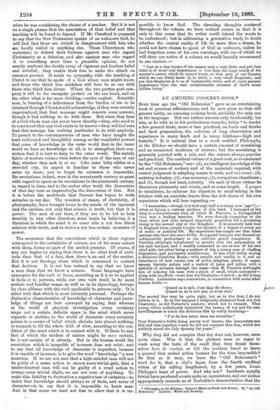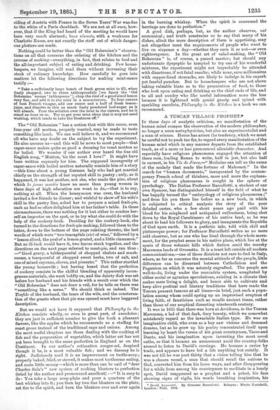AN AMUSING COOKERY-BOOK.*
SOME time ago the "Old Bohemian" gave us an entertaining book of personal reTniniscences, and he now gives us that still greater rarity, an amusing cookery-book, probably the only one in the language. But our author amuses only incidentally, his aim, as he tells us in his preliminary remarks, being "to tender a few general hints, more or less practical, on foods and drinks and their preparation, the outcome of long observation and
experience in many lands and in many kitchens—high and
humble." It is natural that in a work entitled Philosophy in the Kitchen we should have a certain amount of moralising and an occasional modicum of science ; but the moralising is generally pointed with a tale, and the science always popular and practical. The cardinal virtues of a good cook, as enumerated by the" Old Bohemian," are—(1), an intelligent knowledge of the art and science of cookery and of the materials required, with correct judgment in adapting means to ends, and vice versa',; (2), untiring industry ; (3), wise economy; (4), scrupulous cleanliness ; and (5), though not least, sobriety. On each of these virtues he discourses pleasantly and wisely, and at some length. A propos to cleanliness, he enforces his objection to snuff-taking in the kitchen with an anecdote drawn from the rich stores of his own
experience which will bear repeating :—
"I remember,—though it is well-nigh half a century now [ago ?],— when at Lyons, a curious incident of this kind. I belonged at the time to a revolutionary club, of which M. Portevin, a distinguished chef, was a leading member. We were fiercely conspiring at the time, which just then seemed singularly propitious for a promising rising in the second city of the Kingdom. It is generally held that in England alone people require the adjunct of a repast to every act; of social or political life. My experience has taught me that other nations also have the same foible. So a grand banquet was deemed an indispensible preliminary to the calincler grand conspiracy, M. Portevin obligingly volunteered to preside over the preparation of the said banquet, and I readily consented to act as one of his two chief aids, the other being a nephew of his, a young man of chaffing disposition, and perversely mischievous. It was while deftly mixing a delicious Charlotte Russo—with canella and vanilla in it, and an abundance of best cream, lots of yolks, isinglass, plenty of sugar, sponge biscuits galore, and a variety of jams and jellies, with a sprinkle of sultanas through the mass—that M. Portevin bethought him of solacing his nose with a pinch of snuff, which unhappily— along with its effect—went into the Charlotte—I saw it ; so did young Portevin. Lafontaine says somewhere, in connection with some other human foible
Quand on le gait, &est bleu de chose; Quand on ne le salt pas, ce n'est rien.'
The second line may be quite right, but as to the first, I do not believe in it. So at the banquet I religiously abstained from the rich Charlotte; so did Portevin's nephew, which led to remark. That young villain audaciously insinuated the reason of my and his own unwillingness to touch the delicious dish by softly humming- " J'ai du bon tabac dan.s ma tabatibre."
Poor Portevin's foible being pretty well known, the banqueters put this and that together,—and we did not conspire that day, which not unlikely saved the July dynasty for years."
Why they did not conspire that day does not, however, seem quite clear. Was it that the plotters were so eager to wash away the taste of the snuff that they drank them-
selves hors de combat, or did the incident breed so fierce a quarrel that united action became for the time impossible P Be that as it may, we have the "-Old Bohemian's"
word for it., that a chef's lapse from the fourth cardinal virtue of his calling lengthened, by a few years, Louis Philippe's lease of power. And why not ? Incidents equally trivial have produced events quite as momentous, and our author appropriately reminds us of Zschokke's demonstration that the
• Philosophy in the Kitchen General Hints on Foods and Drinks. By "An Old Bohemian." London : Ward and Dowvey.
siding of Austria with France in the Seven Years' War was due to the whim of a Paris shoeblack. We are not at all sure, how-
ever, that if the Sing had heard of the meeting he would have been very much alarmed; bons vivants, with a weakness for
Charlotte Russe, are not exactly the stuff out of which danger- ous plotters are made.
Nothing could be better than the "Old Bohemian's" observa- tions on all that concerns the ordering of the kitchen and the process of cooking—everything, in fact, that relates to food and the all-important subject of eating and drinking. Few house- keepers, we imagine, will read them without increasing their stock of culinary knowledge. How carefully he goes into matters let the following directions for making mint-sauce testify :—
"Take a sufficiently large bunch of fresh green mint to fill, when finely chopped, two to three tablespoonfuls [we fancy the 'Old Bohemian' means tablespoons '], chop the rind of a good-sized lemon very fine, and add it to the mint in a sauce-tureen. To four ounces of best French vinegar, add one ounce and a half of fresh lemon. juice, and dissolve in this as much finely powdered loaf-sugar as it will absorb. Pour the solution over the mint in the tureen, and let it stand an hour or so. Try to get your mint clean that it may not need washing, which tends to take the freshness off."
The "Old Bohemian" has a notion that with this sauce, even four-year old mutton, properly roasted, may be made to taste something like lamb. We can well believe it, and we recommend all who have any doubt on the subject to try the experiment. He also assures us—and this will be news to most people—that caper-sauce makes quite as good a dressing for roast mutton as for boiled. We wonder if our author ever heard the fine old English song, "Mutton, 'tis the meat I love !" It might have been written expressly for him. The supposed incongruity of caper-sauce with boiled mutton naturally reminds him of a story —this time about a young German lady who had got married chiefly on the strength of her reputed skill in pastry ; only, as it
happened, it was her mother, not she, who made the pies, about which /a jeans mariee knew no more than young women in these days of high education are wont to do,—that is to say, nothing at all. When the honeymoon was over, the husband
invited a few friends to dinner; and wishful to show off his wife's skill in the pastry line, asked her to prepare a mixed fruit-pie, such as had so often delighted him at her father's table. In these circumstances, there was nothing for it but either to confess her- self an impostor on the spot, or to try what she could do with the help of the cookery-book. Deciding for the cookery-book, she turned to the directions for fruit-pie making, followed them to the
letter, down to the bottom of the page relating thereto, the last words of which were "two teacupfuls (sic) of wine," followed by a "lemon sliced, the peel of a lemon grated, and a little cinnamon." But as ill-luck would have it, two leaves stuck together, and the directions on the next page referred to meat-pie, and ran thus : —"Good gravy, a tablespoonful of chopped shalots and mush- rooms, a teaspoonful of chopped sweet herbs, two of salt, and
one of mixed cayenne, cloves, and pimento." This rather startled the young housewife ; but having heard that the perfection
of cookery consists in the skilful blending of apparently incon- gruous materials, she went boldly on, and the dainty dish was set before her husband and his friends with a result over which the "Old Bohemian" does not draw a veil, for he tells us there was "something like a scene." We should think so indeed. The Teufels of the husband, the tears of the wife, and the consterna-
tion of the guests when that pie was opened must have beggared description.
But we would not have it supposed that Philosophy in the Kitchen consists wholly, or even in great part, of anecdotes;
they are just in sufficient number to give the book a pleasant flavour, like the apples which he recommends as a stuffing for roast goose instead of the traditional sage and onions. Among the most useful chapters are those dealing with the cooking of fish and the preparation of vegetables, which latter art has not yet been brought to the same perfection in England as on the Continent. In our author's estimation conger-eel, despised though it be, is a most valuable fish ; and we daresay he is right. Judiciously used it is an improvement on turtle-soup; properly baked, fried, or stewed, it makes most toothsome eating, and costs little money—which is-more than can be said of "dear Charles Sala's " new system of cooking bloaters to perfection (tried by the author and pronounced excellent) :—" It is easy to do: You take a large soup-plate and pour a quartern of the best whiskey into it; you then lay two fine bloaters on the plate, set fire to the spirit, and turn the bloaters over and over again in the burning whiskey. When the spirit is consumed the herrings are done to perfection."
A good dish, perhaps, bat, as the author observes, not economical; and truth constrains us to say that many of his dishes, albeit the mere description of them is appetising, may not altogether meet the requirements of people who want to live on sixpence a day—whether they earn it or not—or even eighteenpence. In the great art of salad-making, the "Old Bohemian" is, of course, a passed master; but should any unfortunate dyspeptic be tempted to try one of his wonderful mixtures, the experiment might not improbably be attended with disastrous, if not fatal results; while none, save millionaires with copper-lined stomachs, are likely to indulge in his superb yet fearful punches. But to housekeepers who are not above taking valuable hints as to the preparation of food, to those who look upon eating and drinking as the chief ends of life, and to all and sundry who like useful information none the less because it is lightened with genial gossip and spiced with sparkling anecdote, Philosophy in the Kitchen is a book we can recommend.



































 Previous page
Previous page